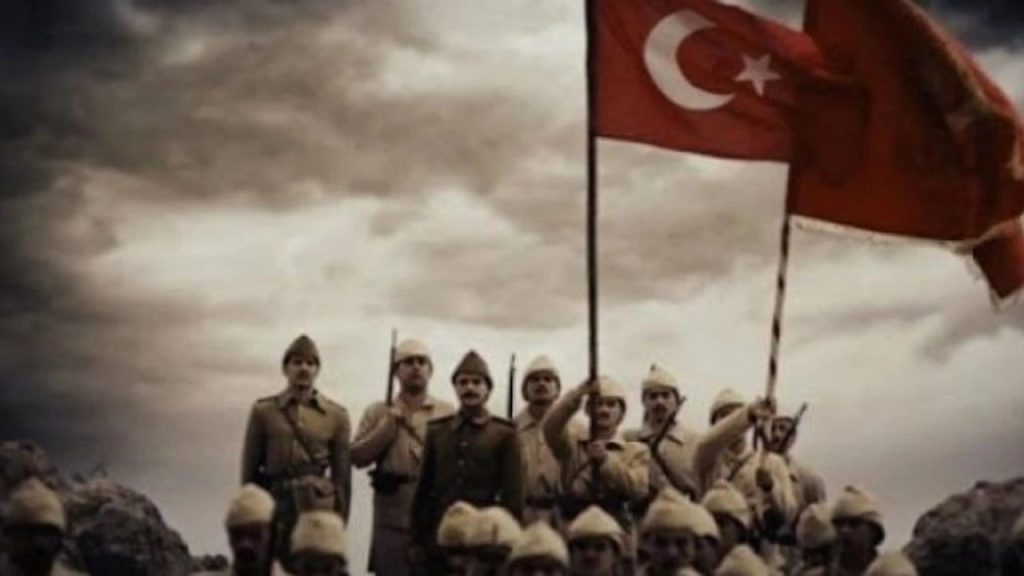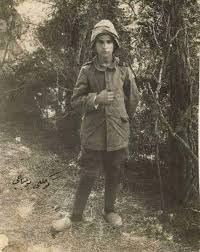(Kınalı) Hasan was a young soldier from the village of Kara Yakup, located in the Sarıkaya district of Yozgat (now a township). With barely a trace of a mustache on his face, he joined the Ottoman army and set off on foot from Yozgat with other boys his age, walking for days until they reached Çanakkale.
There, he was assigned to the 64th Infantry Regiment, 1st Battalion, 2nd Company, becoming a proud Mehmetçik (Turkish soldier) alongside his comrades.
The Mystery of the Henna on Hasan’s Head
Captain Sırrı Bey, the commander of Hasan’s company, was inspecting the troops when he noticed something unusual, henna on Hasan’s head. While the captain had often seen soldiers with henna on their right hands or toes;a tradition before heading to the front;this was the first time he had seen it applied to the head.
Curious, he asked Hasan about the meaning of the henna. Embarrassed and a little saddened, Hasan replied:

“Commander, my mother applied it before I came here. I didn’t ask her why.”
To which Captain Sırrı Bey responded:
“Then write her a letter and ask. Let’s find out together.”
Hasan admitted he didn’t know how to write, so the captain instructed him to dictate the letter to the company clerk. Hasan agreed.
A Letter Home: Asking the Meaning of the Henna
During a rest break, the company clerk came to Hasan, and he began dictating a heartfelt letter. After the usual greetings and stories of camaraderie, he finally asked:
“Mom, my commander noticed the henna on my head. I couldn’t explain it and felt embarrassed among my friends. If it means something, please let me know so I can tell him.”
The letter made its way to the dusty roads of Yozgat.
A Mother’s Answer from Yozgat
About two months later, the reply arrived. The village clerk had read the letter to Hasan’s mother, Hatçe, and written down her emotional response. Captain Sırrı Bey read it aloud:
“My dear son, Hasan, my hennaed lamb,
Your letter arrived, it felt like the whole world was mine. The clerk read it to me, and I cried.You seem to love your commander very much;how wonderful! Obey him as you would obey your own father. Even if he tells you to walk into fire, do it, my child.
You’ve made friends from Kars, Siirt, Adana, and Uşak. Be kind to them. They are your true brothers in this world and the next. Never hurt them, my son, or I won’t give you my blessing.
So your commander asked about the henna on your head. What is there not to know?
Here in our village, we decorate the heads of lambs chosen for sacrifice to God with henna. Among my four sons, I loved you the most, so I chose you to be a sacrifice for God, the nation, and the homeland. That’s why I hennaed your head.
Your mother, Hatçe”

A Heartbreaking Ending to Kınalı Hasan Story
Captain Sırrı Bey read the letter with tears streaming down his face. He then summoned the mail orderly:
“Find me that Yozgat boy, Kınalı Hasan. I want to read this letter to him, he cannot read.”
Not long after, the orderly returned with heartbreaking news:
“Commander, Hasan fell in battle at Arıburnu last week during intense combat. He has returned to his Creator.”
Overcome with emotion, Captain Sırrı Bey wept. And in that moment, he deeply understood why the enemy had failed to breach Çanakkale, despite their overwhelming strength.
Kınalı Hasan: The Symbol of Sacrifice at Gallipoli
Hasan became known by the name “Kınalı Hasan” (Hennaed Hasan); a symbol of ultimate sacrifice at the Battle of Gallipoli. His story lives on, reminding generations of the spirit of devotion, faith, and patriotism that defined the defense of Çanakkale.
“My mother marked me with henna, to offer me as a gift,
And I was born to be a sacrifice for my land.
A final gift from my mother to God,
I was born an Ishmael.”
Notes:
- The reference to İsmail (Ishmael) evokes the Qur’anic story of Prophet Abraham’s willingness to sacrifice his son, symbolizing absolute devotion and surrender to God.
- The henna, traditionally used on animals chosen for sacrifice, powerfully symbolizes Hasan’s selfless offering to his country.
